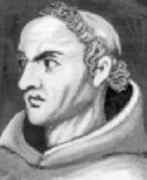Who was William of Occam? (1285?-1349?) William of Occam was an English Franciscan who taught at Oxford from 1309 to 1319. Denounced by the Pope, he fled to safe-haven in Germany under the Holy Roman Emperor, Louis IV in 1328. He died of the “Black Death”, which was introduced to Europe by the Moslems in 1346.
Historical context. Edward I was coroneted in 1274, bringing to the throne a burning desire inherited from his father, Henry III, to rule alone over a united Britain. The barons under Simon de Monforte resisted, drawing up the Provisions of Oxford in 1258, which established Parliament as a counterbalance to the King. In the battle that ensued, the forces of de Monforte captured and imprisoned both Henry and Edward. Edward escaped and in a rematch annihilated de Monforte’s army, flaunting the rules of war by killing the wounded and mutilating the dead.
Edward’s first order of business was to subjugate Wales, whose leader Llewellyn had neglected to attend Edward’s coronation. Later in 1291, when asked to mediate between two contenders for the Scottish throne, Bruce and Baliol, Edward exacted as a condition that the winner submit to his Lordship. Baliol won and played the part of a pawn for some five years before William Wallace rebelled in 1298. Wallace achieved initial victory at Stirling Bridge, but was defeated at Falkirk in 1298, then betrayed and executed in 1305. Robert Bruce assumed the kingship and routed Edward II at the Battle of Bannockburn near Stirling in 1314.
Meantime, the last Crusade ended in defeat for the West in 1292 when William of Occam was a boy of seven . One of the outcomes of the Crusade era, had been the reintroduction of certain aspects of ancient Greek thought back into Western Europe through an influx of ideas from Byzantium and the Moslem world. Picking up this ball and running with it, Thomas Aquinas had seized upon Aristotelian philosophy and logic with the hope of integrating it with Christianity. Aquinas, a disciple of the popular philosopher Albertus Magnus, devoted his life to developing the “classical synthesis”, a monumental effort to validate revelation by reason and empirical observation. That effort culminated with his death in 1274. The work of William of Occam contradicted that of Aquinas.
Summary of William of Occam’s teaching. Aquinas’ work gave great impetus to the Scholastic movement, which sought to develop a unified system of knowledge and produced the university system. “University” means “one word”. It was Thomas’ great hope to demonstrate the compatibility of faith and reason, thus rendering faith acceptable to the natural man. On the other hand, Thomas’ great opponent, William of Occam, held that faith cannot and indeed need not be demonstrated by reason. Revelation must simply be accepted as emanating from an all-powerful God. This philosophical reductionism led him to formulate what has become known as Occam’s Razor: “Entities are not to be multiplied without necessity.” Reductionism is the belief that a system is best understood by reducing it to its component parts. Newton’s restatement of the principle was “admit no more causes of natural things than such as are both true and sufficient to explain their appearances.”
Occam gave great impetus to “nominalism”, in which truth is seen as deriving from inductive examination of patterns in nature rather than deduction from dogma. Truth exists only in the mind of man and assumes whatever form the mind of man gives it (nominal means “to name”) without regard to external authority such as the Bible. Only that which can be seen is real, according to Occam. While the Scholastic movement had spent much effort in seeking to rationally explain alleged contradictions in Scripture, Occam taught that it was unnecessary to explain God and the Bible in rational terms. Although Occam is considered Aquinas’ great opponent, there was a sense in which his teaching was the inevitable outgrowth of Thomas’ Aristotelian empiricism. Empiricism regards sense-data derived from observation or experiment as the source of valid knowledge. Occam simply extended this approach to its logical conclusion. Occam’s work was reinforced by his contemporary, Marsiglio of Padua (1274-1343), a fellow Franciscan whose Defensor Pacis applied this philosophy to the political realm, resulting in a state divorced from theology.
Implications for subsequent history. William of Occam was one of several philosophers following Aquinas who changed the direction of the Scholastic movement, indeed the entire thrust of all future Western philosophy. In reality, Occam was subtly undermining the foundations of Scholasticism. Richard Weaver, in his classic Ideas Have Consequences (University of Chicago Press, 1948, p.3) laid the blame for the disintegration of Western civilization squarely on the shoulders of William of Occam. “It was William of Occam who propounded the fateful doctrine of nominalism, which denies that universals have a real existence. The practical result of nominalist philosophy is to banish the reality which is perceived by the intellect and to posit as reality that which is perceived by the senses.”
Ultimately, Occam’s position paved the way for modern man to dismiss the relevance of Christianity to “real life.” The Bible is now generally viewed as irrational and irrelevant in the popular mind. Its teaching is restricted and reserved for the esoteric realm of theology and the individual soul. The intelligencia came to agree with Occam that there was no urgent need, or even possibility, of reconciling theology, philosophy and secular thought. The implications have been devastating.
Biblical analysis. Christianity is a reasonable faith; that is not contrary to reason and is, in fact, apprehended and applied to the world by man’s rational capacity. In fact, nothing else can be rationally understood apart from the Christian worldview centered on the Creator God. Jesus great commandment was to “love the Lord thy God with all thy heart, and with all they soul, and with all thy mind.” (Mt. 22:37)
Corrective or Prescriptive Actions: Occam was wrong. Christianity is a faith for all of life, providing authoritative instruction for the world of politics and business as well as the church. It is the essence of the Great Commission to extend the Lordship of Christ into all realms of earthly existence.


